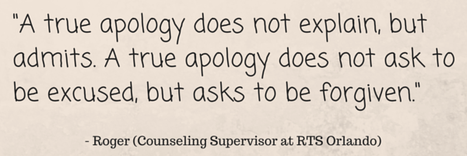|
As human beings, we've all been there - we've done something to hurt another. We've been taught that when we do that, we just apologize - preferably in a sincere manner. Just saying "I'm sorry" is only one part of the process of a true apology. Many people tend to look for excuses as to why they did something - they look for justification. Maybe it's a coping mechanism so we can pretend that what we did wasn't really wrong because of x,y and z. No matter the excuses, it doesn't change the fact that our words or actions hurt another. As the saying goes, don't let your excuses ruin your apology. I don't remember where I learned the process below, but I've found it to be the best way to apologize. Most people stop after Step 2, but Step 3 is what really seals and heals the deal.
Step 1: Acknowledge and accept what you've done wrong. It's shocking how many people will throw the blame outside of themselves. Acknowledge to yourself that what you did was wrong, no matter what your reasoning was. Accept that what you said or did hurt the other person. When you're apologizing to the person you hurt, tell them. For example: I know what I said/did was wrong. I know that it hurt you. Step 2: Apologize. Look the person in the eyes and tell them you're sorry. It's easy to just say "I'm sorry" and not really mean it. It's not easy to just glaze over your apology when you're actually looking them in the eyes. It's also a physical cue that tells the other person you acknowledge what you've done. Most people tend to stop here. It's important to remember the phrase: actions speak louder than words. Step 3 backs up your apology and is the way to move forward from your wrongdoing. Step 3: Take action. After you've apologized, ask the person: What can I do to make things right? Listen to what they have to say and follow through. It's easy to say "I'm sorry," but it takes some work to make amends. Of course, if their request is unreasonable, you stand your ground and ask to work together towards healing the situation. You can also allow them some time to think it over - sometimes the wounds we inflict are much deeper than we realize. What matters is you're offering an action step to show them you're serious about your apology and that you're backing it up. No matter how big or small the wrongdoing, a true apology includes: "I know that my words/actions hurt you. I'm sorry. What can I do to make things right?" Using these three steps sends you on your way to righting the wrong by taking responsibility and taking action. Love, Adrienne :)
0 Comments
Leave a Reply. |
Archives
June 2024
AuthorHello! I'm Adrienne Almamour, an empathic intuitive conduit. I assist people by detecting and clearing their subconscious emotional energy blockages. This blog is a commentary and reflection of life from an intuitive standpoint which also incorporates ways that allow us to be from our heart. |

 RSS Feed
RSS Feed